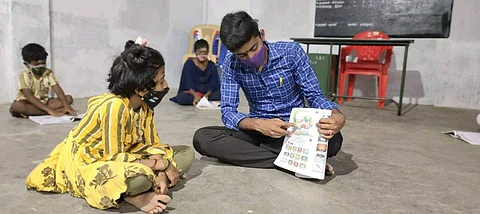

In April this year, the video of a Class XII student hurling abuses and threatening his botany teacher at a government school in Tirupattur went viral on social media. The boy’s temper flared after his teacher woke him up from sleep during class and asked him whether he had submitted his record book.
This incident, however, was not an isolated one. Cases of students becoming unusually aggressive have been reported from Vellore, Salem, Theni, Coimbatore, Kanniyakumari, Chennai, Tiruppur, and Madurai, making them pan-Tamil Nadu phenomena. In many of these incidents, the videos of which made their rounds on social media, students were seen verbally abusing teachers, teasing and threatening them, breaking desks in classrooms, having liquor in buses, and fighting in bus stands.
While it is convenient to brand these children as brash or unruly and call for disciplinary measures, educationists believe that a spurt in such incidents may have its roots in the long absence of students from schools during the Covid-induced lockdowns and the online education that followed.
Pandemic and poverty
G Gopi, a teacher at a government school in Vellore, said: "We dealt with disobedience among students even before the pandemic, but things changed after children from poor families started taking up part-time jobs to support their families during the pandemic and having money in their pockets. They started bringing their workplace attitude to classrooms, including the use of tobacco and other intoxicants," he said.
Gopi said over 20% of students in government schools across the State were working part-time now and often gave classes a miss. A few students in his school even dropped out just a few months after schools reopened for physical classes.
Mobile phone addiction
Gopi also highlighted the complaints by several parents during School Management Committee meetings that their wards were using cell phones excessively and getting addicted to mobile phone games.
T Veeramani, professor of psychology at government arts college in Coimbatore, said, “During the past two pandemic years, the use of cellphones by students has grown so much that some take the device for a companion. When schools reopened for physical classes, they started using the devices even during the classes.” Many studies, Veeramani said, have found that higher levels of mobile phone use affected students’ mental health, leading to aggression and loneliness.
He said that aggression in psychological terms stemmed from frustration, which rose from poor judgement and decision-making skills. Those who used mobile phones excessively tended to fare poorly in such skills. Notably, internet access via mobile phones also allowed people to be aggressive towards others without having to speak to them face-to-face.
Also, the isolation many students felt during the pandemic and parents’ inability to offer emotional support could have contributed to the issue.
“Indian curricula are rooted in offline education with practical demonstrations. When education shifted online, it became hard for teachers to monitor their students. Parents gave their wards space and time to attend online classes, but this led to many students getting addicted to mobile phones. Such students should be given psychological and behavioural therapies,” Veeramani said.
The way forward
Many teachers that TNIE spoke to demanded that they be allowed to subject unruly students to corporal punishment. It may be recalled that School Education Minister Anbil Mahesh Poyyamozhi had said such students would be expelled from schools and the reason for their expulsion would be mentioned on their TC.
However, Dr Poorna Chandrika, director in-charge of the Institute of Mental Health in Kilpauk, said the solution lay in addressing the psycho-social problems of the child. "Parents should try to reduce the screen time of their wards through tech breaks and encourage them to engage in outdoor games and other activities. Families should organise social gatherings so that children get to communicate with their peers."
Children with deviant behaviour should be given extra attention and they should be tested for learning disabilities such as dyslexia and ADHD, she said.
Teachers can opt for such measures as asking undisciplined students to sit for an extra hour in the class. "The government can explore options like giving them one week’s social service in hospitals or children's shelter homes," she said, adding that the days of disciplining students through corporal punishment were over.
K Balamurugan, president of TN Psychology Association, recommended that psychoeducation, which, he said, entailed learning life skills and improving the self-confidence of students, be introduced in schools as a supportive subject.
“Many students are under stress owing to family disputes, puberty, inferiority complex, social media, mobile phone addiction and so on. Earlier, there was the provision of mobile counselling wherein psychologists visited schools and offered individual and group counselling to students; this is no longer available to students,” he said.
In 2012, in the wake of the killing of a teacher by a student in Chennai for repeatedly sending negative remarks about his studies to his parents, the Madras High Court directed the State government to offer psychological counselling to school children. Mobile counselling was introduced in 2013 as a result of this direction.
Since 2018-19 academic year, however, funds have not been allotted to this scheme, according to sources. It also didn’t find any mention in the recent policy note of the school education department.
Attempts to reach School Education Secretary Kakarla Usha went in vain.
